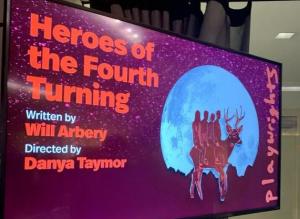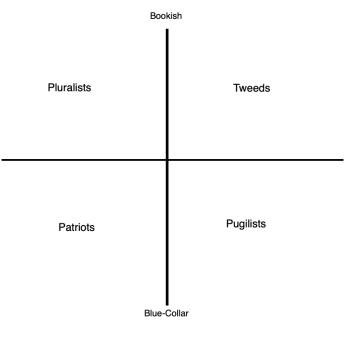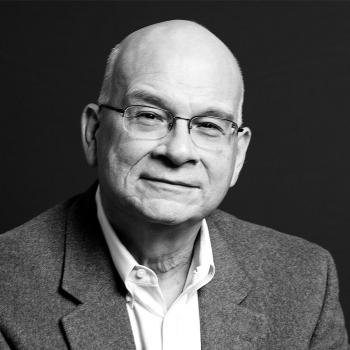 It’s impossible for me to be perfectly objective about Will Arbery’s remarkable new off-Broadway play, Heroes of the Fourth Turning. That’s because, for all intents and purposes, I’m one of Arbery’s characters—or, at the very least, a resident of the world he captures. And the drama that plays out onstage could’ve been lifted, chapter and verse, from the conversations I’ve had in the last few years with my closest friends.
It’s impossible for me to be perfectly objective about Will Arbery’s remarkable new off-Broadway play, Heroes of the Fourth Turning. That’s because, for all intents and purposes, I’m one of Arbery’s characters—or, at the very least, a resident of the world he captures. And the drama that plays out onstage could’ve been lifted, chapter and verse, from the conversations I’ve had in the last few years with my closest friends.
As a bit of background, Arbery is the son of the president of Wyoming Catholic College—a small liberal arts school in rural Wyoming that closely resembles my own Patrick Henry College. Just like PHC, Wyoming Catholic eschews federal funding and centers on a substantial core curriculum drawn from the Western tradition. And just like PHC, Wyoming Catholic tends to produce graduates who regularly reckon, for years, with the themes that informed their education and their core theological convictions.
Heroes centers on four graduates of the fictional Transfiguration College—an obvious stand-in for Wyoming Catholic. The friends have gathered in August 2017, just after the white supremacist march and violent protests in Charlottesville, to visit their longtime mentor Gina, who helms the college. All the action unfolds around a backyard bonfire that looks eerily like one I built a few months ago with my own college friends.
The first graduate we meet is Kevin—a lanky, long-haired, passionate philosophy-bro, who on any other campus would have smoked a lot of weed. Kevin spends his days working for a Catholic publishing house in Oklahoma and his nights masturbating to internet porn. The cognitive dissonance is not lost on him: Kevin staggers and wails across the stage, castigating himself for his moral failures while simultaneously blasting the hedonism of modernity. Lurking beneath his “Catholic guilt” is his deepest desire of all: his longing to be in a relationship with a woman who will actually love him—or, at least, sleep with him.
The second is Teresa, a high-powered Brooklynite who’s fully embraced the spirit of MAGA. She challenges her peers in rapid-fire diatribes interweaving Steve Bannon, Samuel Huntington, and the Catechism of the Catholic Church, pivoting seamlessly from discussion of the Virgin Mary’s role in salvation to the threat of Islam and the moral horror of abortion. She is the consummate college debater, armed with ironclad convictions (or at least the pretense of them), pristine prose stylings, and the professional apparel to match. In Teresa’s psychological universe, there is no room for gray areas or self-sacrifice: hers is a politics of Breitbart-meets-Church-Militant, one that cannot ascribe any motives other than malice to “the left.”
The third is Justin, an ex-Marine sharpshooter and older graduate who still lives in Wyoming. Justin is a “crunchy con,” an agrarian-minded conservative with an affinity for Rod Dreher’s “Benedict Option,” which focuses on strategic withdrawal from the public square in favor of intentional institution-building. But Justin, like Teresa, nonetheless believes a civilizational catastrophe is coming—and he’s a big proponent of adding a marksmanship course to the college curriculum, just in case things get bad.
The fourth is Emily, Gina’s daughter, who suffers from debilitating Lyme disease. After years of pro-life activism, Emily has grown more compassionate towards those not sharing her views—and more critical of the social and structural systems leading women to seek abortions in the first place. Emily believes in narrating the world sacramentally, seeing all things—even the worst suffering—as ways in which the light and grace of God is made manifest. But, as we eventually learn, even her apparent serenity has a breaking point.
Heroes unfolds as a series of encounters between these four protagonists, clashes that disclose profound intellectual and theological fault lines on the right. Early on, Teresa systematically deconstructs Justin’s self-loathing pronouncements of his own sinfulness, identifying them as a form of cowardice: in Justin’s cringing self-absorption over the fate of his own soul, he cannot hope to provide genuine support or partnership to anyone else (or, for that matter, shape the culture in any meaningful way, despite his talk of “engagement”). Shortly thereafter, Emily and Teresa spar over the limits of empathy and whether there can indeed be “good people” on both sides of the abortion debate. Kevin and Justin argue over whether there’s a moral obligation to battle for Catholic truth and identity in the public square rather than retreating to secluded intellectual enclaves. And so on it goes until Gina herself steps onstage.
Gina—the college president—is the avatar of “boomer conservatism.” Raised in the ferment of anti-communist ideology, with an affinity for Barry Goldwater and Pat Buchanan, Gina conceives of national division as a struggle between the virtuous individual and the malignant collective—a collective that happens to be a mishmash of Occupy Wall Street, the Women’s March, and Black Lives Matter.
Teresa conceives of the struggle rather differently. To Gina, the essential purpose of an education—specifically, a Catholic Great Books education of the sort cultivated by their tiny Wyoming college—is the appreciation and defense of the Western (read: American and Republican) tradition. But this tradition, it turns out, is precisely what—as Teresa explains—the modern identitarian left wishes to tear down. All the identitarians hear when Gina speaks, Teresa argues, is whiteness whiteness whiteness—endless variations on the theme of America’s original sin of slavery, a sin inscribed in the Constitution’s very text. How can it ever be wrong, Teresa posits, to fight fire with fire—to deploy the language of identity from the opposite direction? Why not defend the West as the West, oppressor/oppressed dyads be damned?
In a sense, this is the French/Ahmari debate with rather more racial subtext—driven by the unsettling fact that many of yesterday’s “mainstream conservatives” were on the wrong side of racial equality. From Teresa’s perspective, Gina’s defenses of Western civilization paper over the uncomfortable realities of identity-driven conflict, conflict that the modern right must take up (in good Bannonite fashion) or be destroyed.
But Gina, for all her own foibles and hypocrisies and unwillingness to confront the racism of “blood and soil” populist politics, nonetheless grasps something profound about Teresa’s fury and turns it against her. Teresa’s chic alt-right sensibilities, accented with fashion and mimosas and cocaine, mask a longstanding reluctance to consider the state of her own soul before God—a reflectiveness which in Kevin has become pathological and crippling, but that Teresa has blocked out altogether. This is exemplified by Teresa’s embrace of “de-sacramentalized” sex that rejects the possibility of procreation: in closing off those parts of herself that incline towards openness, towards a self-giving love for husband and children (and towards a love for the Other, who too is made in God’s image), Teresa has locked herself in a prison of her own devising. That is to say, the “contraceptive mentality” has crippled her capacity for self-giving love.
Gina, Teresa, and Kevin depart, and as the fire’s last embers burn low, the only two remaining are Justin and Emily—between whom sexual tension has been simmering all night long. At last, Justin turns to confess something to Emily. As she leans in expectantly, Justin draws a deep breath and forces the words out…he’s considering entering a monastery.
Sweet, saintly Emily revolts—lashing out against God, the world, her peers, and herself in a scorching cri de coeur. Her cries are charged with a profound anguish: first, rage over the fact that because of her illness, she can only be seen as icon rather than as woman; and second, contempt that Justin’s “retreat from the world” is so totalizing that he cannot even take up the duties of husband and father when she needs that from him. At some point, desire will out—even Emily cannot will herself into a completely desexed existence where abstract virtue forever supplants concrete human union. And with that burst of existential fury, Heroes draws to a close.
For those raised in this world—and those who still inhabit it—Heroes is a raw, wrenching, visceral experience that lays bare the neuroses of the millennial-theological-conservative mind. In a world where George Will, Jeff Flake, and Arthur Brooks are still somehow taken to be thought leaders of the right, Arbery’s play is a riveting study of conservatives as they really are.
Now, as one might have expected going in, Heroes ends in ambiguity and darkness—an ambiguity that seems to reflect Arbery’s own sentiments toward his upbringing. Indeed, it’s possible that progressive viewers of Arbery’s play will come away not sobered, but simply scandalized that people actually think like this. But that does nothing to change the fact that the big ideas and psychological undercurrents on display in Heroes are, in many spaces, driving the discourse. The play is authentic at the most fundamental levels, even if its conclusion doesn’t really satisfy.
It would be easy to end the discussion with that—and, to be sure, that’s what most right-of-center reviewers have done, recommending Heroes for its integrity and leaving off there. But I think the conversation really ought to go further, that those who come from Arbery’s world should try to grapple with the questions he poses.
First up, it seems to me, is the nature and destiny of “the West”—a theme that pervades the entire play. Early on, Teresa—in response to a question from Kevin about why the Virgin Mary ought to be venerated—delivers a high-speed monologue on the “scandal of particularity.” Drawn from Protestant theologian Walter Brueggeman, the term refers to the fact that any religion with a claim to divine revelation must locate God’s acts as somehow reflected in the contingent vagaries of history. This is what differentiates a faith like Catholicism from pure Neoplatonism or Enlightenment deism: only the former posits that God worked in timein particular moments for particular purposes, thereby destabilizing the regularity of everyday existence. As John Updike so eloquently put it, “Make no mistake: if he rose at all / It was as his body / If the cell’s dissolution did not reverse, the molecule reknit / The amino acids rekindle / The Church will fall.” That scandal is also reflected in the Mass, in which the elements of bread and wine become the Body and Blood of Christ—and in all sacramental theologies.
Misappropriating Brueggeman’s theme, Teresa reads the particularity of Catholic Christianity as the warrant for her unabashed Western chauvinism. But although none of Arbery’s characters call Teresa on the point, this approach conflates an amorphous, idealized conception of “the West” with the Church itself. Where are the Byzantine or Palestinian Catholics in Teresa’s world? If these are to be excluded from her “West,” the criteria Teresa is using to delimit “Western civilization” are something quite different from those that define Christ’s Church—and something much more insidious.
What Teresa’s paradigm is missing is what Lutheran theologians have called the principle of finitum est capax infiniti—the finite is “capable” of the infinite. Traditionally, this term has been deployed in the context of sacramental theology to refer to the relation between Christ’s divine and human natures in the Eucharist. But at a higher level, the principle also captures the reality that the truth-claims of Christianity are both particular (finite) and universal (infinite); they are particular in their historical eventuality (Jesus was incarnated once) and universal in their reach (Jesus’s message is for all). That is, it is within our finitude that we truly encounter God’s infinity and universality. And so cabining the Church’s life to a particular cultural form (“Western civilization” in the abstract) ignores the fact that the universal truths of faith are not tied to the political contingencies of history.
In drawing out this point, I’m walking along the edge of a fundamental dispute between Catholics and Lutherans: whether the “visible church” (for Catholics, the Roman Catholic Church) or the “invisible church” (for Lutherans, the “priesthood of all believers”) has primacy. Teresa’s argument is undoubtedly stronger if one holds to a Catholic ecclesiology (after all, the Pope is a particular man who is also the Vicar of Christ—scandalous!). But I think even on a fundamentally Catholic account, Teresa’s crabbed view of the Church in history must fail: as Walter Miller’s brilliant A Canticle for Leibowitz reminds us, the universal claims of the Church can survive even global apocalypse. There is no need to defend a vision of “the West” that is, at bottom, racialized.
Another lingering theme in Heroes is the problem of vocation—that is, what it means to live well in a world that is, at best, indifferent to matters of faith. But here, too, is a paradigm problem: some of Arbery’s characters try to withdraw from the public square (Justin, Emily), while others ostensibly “engage” (Teresa, Kevin), but none are really capable of thinking beyond themselves and their own objectives.
Notably, none of Arbery’s characters are married or have children. This is, at the very least, inconsistent with my own experience: the majority of my college peers are now married, many with children of their own, and most seem content with their lives and secure in their convictions. In part, I think this flourishing is because marriage is, in Scott Hahn’s words, “the first society”—the elemental building block upon which a stable social order rests. It provides an opportunity to die to oneself, to live for another’s good, and to view the world with an eye to preserving it for future generations. And it is good.
Arbery’s characters are profoundly concerned with their own roles in the drama of cultural crisis (they, after all, are the eponymous Heroes of the Fourth Turning). But family bonds subvert that egocentrism: to be a husband is to be committed, if necessary, to lay down one’s life for one’s wife. It is to be committed to prioritizing another’s good over one’s own—which no character onstage, with the possible exception of Emily, strikes me as capable of doing. Perhaps paradoxically, though, it is in that very self-sacrificial commitment that one finds the purpose and identity they long for—and that Arbery’s characters can’t seem to find. (Mary Eberstadt’s new book Primal Screams explores this point in much greater depth).
Heroes also raises questions about the nature and destiny of liberal arts education within a confessional frame. Once Gina appears on the scene, her former students soon challenge the conservative ideological orientation of their college pedagogy. They question the curriculum’s implicit assumption that, when engaged in an authentically Catholic intellectual inquiry, “there was only ever one conclusion.” But intriguingly, their charge doesn’t imply that the college’s religious commitments preclude genuine inquiry. What they’re concerned with is the blending of Catholicism with a very particular form of political commitment—Reaganite neoliberalism.
As a threshold matter, it seems to me that this tension is uniquely heightened in the Catholic context because of the difficulties involved in reconciling Catholic Social Teaching with certain aspects of the contemporary economic order. But the broader point is well taken—a liberal arts education, even one communicated from a conservative perspective, cannot unreflectively immunize the structural (that is, economic) status quo from searching analysis.
The key, it seems to me, is found in rigorously distinguishing critical analysis of existing social and political structures from a “hermeneutic of suspicion” that treats all authority claims as intrinsically dubious. In theory, this should not be difficult: many conservatives manage to be able critics of the modern “administrative state” without embracing skepticism about the whole American project as a whole. But in practice, when certain political sacred cows (free trade?) are on the butcher’s block, the temptation to cry communism or postmodernism becomes a powerful one—as Gina reminds us. This can, and should, be resisted.
Certainly, much more could be written about Heroes—the play is so rich that I wish I could see it again—but I’ve already said plenty. Suffice it to say that as wrenching as his dilemmas may be, I don’t think the philosophical challenges Arbery poses are genuinely insurmountable, from the perspective of the small-c catholic tradition. What they cannot be, however, is ignored—as Arbery’s characters remind us, these questions cut to the very quick of what it means to live faithfully and seek the Good. And (as Alasdair MacIntyre might put it) a truly living, dynamic tradition possesses the resources within itself to answer them.
All that to say: go see Heroes. You will not regret it.












